#Tom Clegg
Explore tagged Tumblr posts
Text









It is romantic, yes. It is peaceful. The sun shines, the sea it is blue. But you forget, mon ami, that there is evil everywhere under the sun.
Agatha Christie's Poirot 08.01 Evil Under the Sun directed by Tom Clegg - dramatized by Anthony Horowitz ------------------------------------------------ Whodunit fan? Find more on Blackram Hall. Avatar pic by Mitchell Turek.
#Agatha Christie#Hercule Poirot#David Suchet#Hugh Fraser#Captain Arthur Hastings#Philip Jackson#Chief Inspector Japp#Pauline Moran#Miss Felicity Lemon#Evil Under the Sun#Tom Clegg#Anthony Horowitz#London Weekend Television#LWT#ITV Studios#Burgh Island#Devon
29 notes
·
View notes
Text


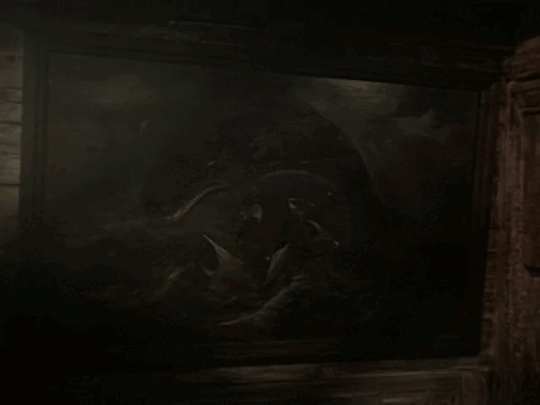

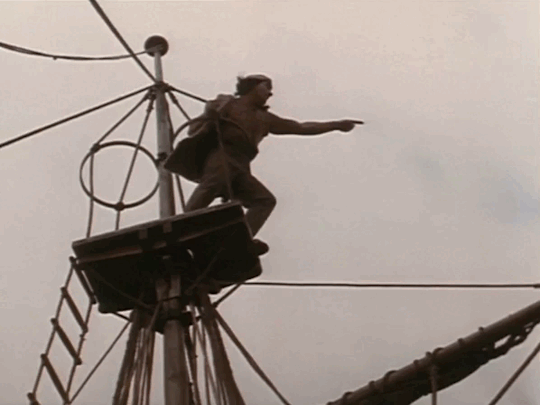
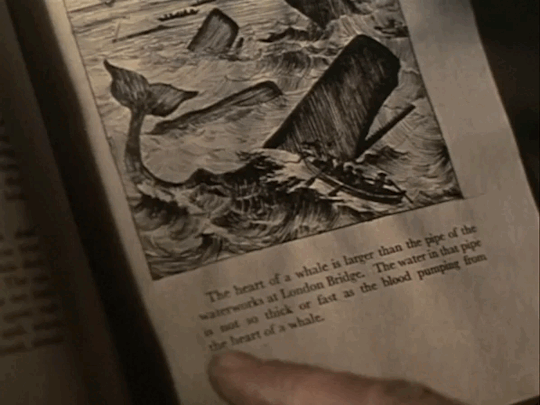
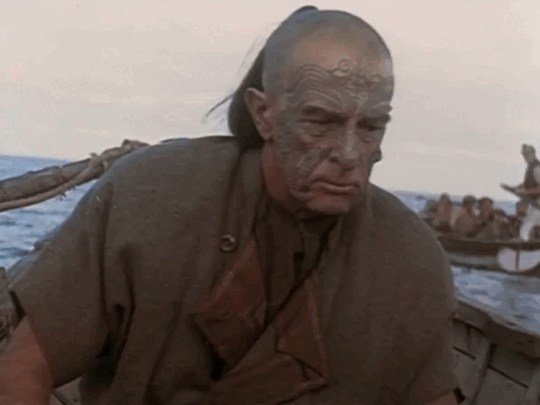
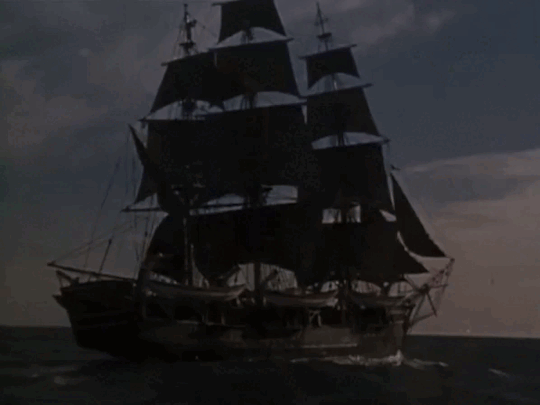

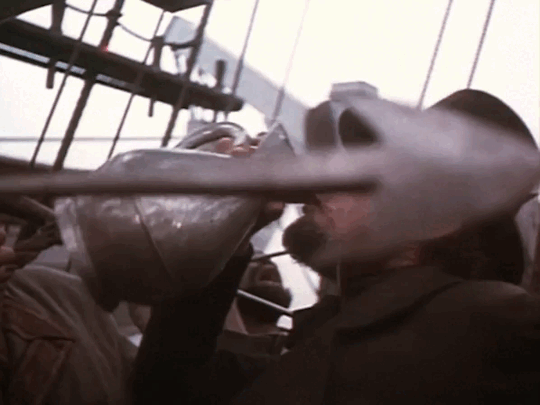

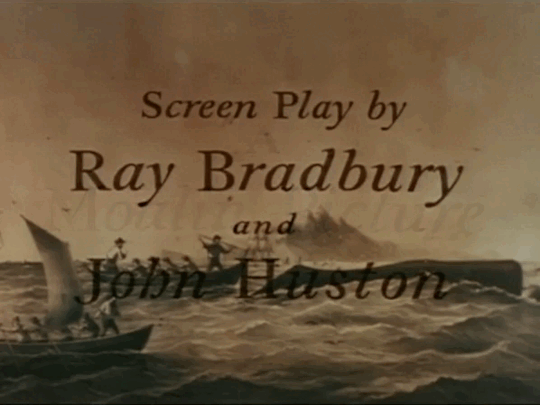
I'll follow him around the Horn, and around the Norway maelstrom, and around perdition's flames before I give him up.
Moby Dick - John Huston (1956)
#Call me Ishmael#Moby Dick#Herman Melville#John Huston#Ray Bradbury#1956#Gregory Peck#Captain Ahab#Richard Basehart#Ishmael#Leo Genn#Starbuck#James Robertson Justice#Harry Andrews#Stubb#Friedrich von Ledebur#Queequeg#Edric Connor#Daggoo#Tom Clegg#Tashtego#Francis De Wolff#Orson Welles
43 notes
·
View notes
Text
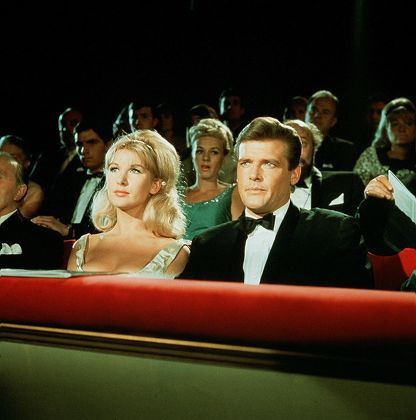

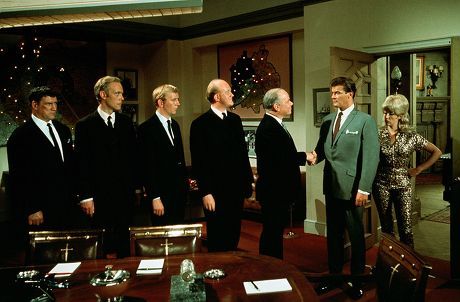


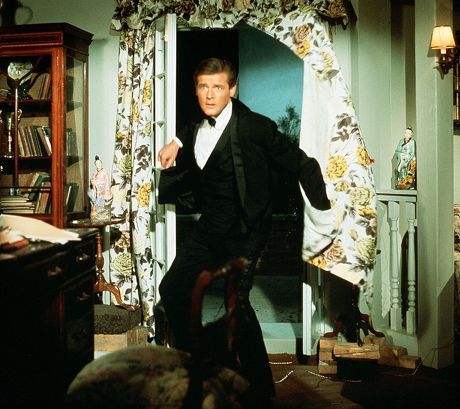
The Saint: The Fiction Makers - Part 1 (6.11, ITC, 1968)
"Mr. Klein, do you remember what SWORD did to the police sergeant in Sunburst Five?"
"Oh no..."
"The equipment is fully operational in the cellar, it can be filled with acid in one minute."
"Oh, you wouldn't!"
#the saint#the fiction makers#1968#leslie charteris#john kruse#roy ward baker#roger moore#sylvia syms#justine lord#kenneth j. warren#philip locke#tom clegg#nicholas smith#roy hanlon#caron gardner#peter ashmore#frank maher#graham armitage#richard franklin#oswald laurence#david rendall#rather surprising that it took the show this long to do a 2 parter; ITC had started playing with the format (two part eps that could be#stitched together for cinema release on the continent) back on The Baron‚ and it had become fairly standard practice by now. this was shot#as two eps and then stitched together (the other Saint film yet to come did the opposite) but per Network's dvd was never repeated in its#episodic format after first transmission (not even itv4 or tptv tend to include them) which might explain why the image does seem rather#badly degraded in places (particularly the credits of part 2). Syms and Lord were two of the most ubiquitous Saint guests with nearly a#dozen appearances between them so it's lovely they came back for this special outing; Syms in particular is the mvp here‚ having played#mostly upper class lady roles on the series to date she really seems to relish the chance to do something different as the ditzy and rather#loud (and most unserious) novelist Amos Klein‚ whose creations have been brought to life by an evil mastermind... yes it's all a bit silly#fun tho! honestly this is a fun time‚ and clearly not taking itself seriously at all
15 notes
·
View notes
Text

#Carry On Screaming! (1966)#Harry H. Corbett#Kenneth Williams#Peter Butterworth#Jim Dale#Fenella Fielding#Tom Clegg#Bernard Bresslaw#Joan Sims#Charles Hawtrey#Angela Douglas
0 notes
Text
youtube
#McVicar#Roger Daltrey#Drama#Prison#England#Britain#The Who#Tom Clegg#1980#1980s#80s#80s Movie#80s Movies#80s film#movies#film#movie#1980s movies#Youtube
1 note
·
View note
Text
Preview- McVicar: The Limited Break-Out Edition [Blu-ray]
Released on Blu-Ray for the first time ever! This is the incredible true story of John McVicar – a man who took on the entire prison system and refused to surrender. Roger Daltrey gives a powerful performance as McVicar in a film that is shocking, brutal and full of gritty violent realism. Based on the true life story of professional British criminal John McVicar, the film strongly depicts the…

View On WordPress
1 note
·
View note
Text








It's the 9 year anniversary of The Watch-A-Thon of Rassilon, so this month we're sharing our older episodes!
FOURTH DOCTOR SEASON FIFTEEN (December 4th, 2018-February 16th, 2019) Episode 92- Horror of Fang Rock (Just This Once, Everybody Dies) w/ Brian Snape & Adam Clegg Episode 93- The Invisible Enemy (A Penny in Your Thoughts For Scale) Christmas Special - The Klepton Parasites (Toni and Joe Blast You to Atoms) PATREON EXCLUSIVE Bonus Episode 3- The Doctor in an Exciting Adventure with the Daleks (Doctor Who: Origins) Episode 94- Image of the Fendahl (Big Finish Pitch Session) w/ @radiantbaby Episode 95- The Sun Makers (Terrance Dicks is a Coward) w/ Nathan Laws Episode 96- Underworld (Minions: Origins) Episode 97- The Invasion of Time (Hey Thanks, Matt) w/ @mgoldentumbls
#doctor who#classic who#classic doctor who#fourth doctor#tom baker#episodes#comic#first doctor#william hartnell#Brian Snape#Adam Clegg#Nicole Mazza#Nathan Laws#Matt Golden
4 notes
·
View notes
Text
Time for some Captain Clegg/Night Creatures (1962) thoughts!! And the very first thought is! It was really, really stupid to change the title to Night Creatures for the US! So stupid! It's not indicative of the content of the movie at all, which I think is partly responsible for the low ratings from some people - looking at the reviews, I feel pretty strongly that they were expecting a different kind of movie than what they got, which really isn't their fault with that title and the American trailer.
Anyway, now that we've got that out of the way - I'll only be referring to the movie as Captain Clegg, and now you know why. I'm going to put everything under a cut, not because I care about spoilers on a movie from 1962, but because I'm not going to filter myself and I'm not sure where/if I'll stop, lol.
First things first: the uncomfortable elephant in the room, the bad guy - the Mulatto. Yes, that's how he's referred to throughout the movie. He's animalistic and violent in his behavior and, because his tongue was cut out, only communicates in wordless yells and grunts. It's pretty racist. The movie is set in 1792, which doesn't exactly make it better, but does make it, at least, period-appropriate for the other characters to view him in this way. Still, the movie does absolutely nothing to counteract this; he is the only cut-and-dry villain of the movie, since even though he's out for revenge on Captain Clegg, the reason his tongue was cut out in the first place was because he attacked Clegg's wife, meaning he was always pretty animalistic and violent even when he could talk, so the film gives him no redeeming qualities or grey areas in the way it does (most of) the other characters. It's...not great. If you watch it, be prepared for that. The 60s could be so progressive, but this movie's a reminder that not everything was.
(I will return to him later, as he does play a role as a sort of "my sins return to haunt me" plot device for Clegg, so there is some purpose behind him being a voiceless character, but that doesn't excuse all of it, so I thought I'd mention that first and we'll get back to his importance as a narrative device later.)
That said, I still enjoyed everything else in this movie so, so much - it's a new favorite for me.
The setup is there's a town on the English coast that's close enough to France to engage in smuggling French alcohol. The reason they need to smuggle it in is because there are, apparently, high taxes on such goods, especially with war with France imminent, and so the King's "revenue men" enforce this, and apparently the villagers would suffer for this. As it stands, they're doing well for themselves because of their smuggling. However, a resident of the village, Tom Ketch, informs on them and Captain Collier and his men are sent to investigate. Tom Ketch is found dead on the marshes, after we see him chased by what appear to be glowing skeletal phantoms riding skeleton horses (it's very cool). We saw him die by fleeing straight into a pool on the marshes and drowning, so while they did chase him to his death, there was no actual murder by the "phantoms."
Collier is determined to find evidence of the smuggling, so Ketch must have brought him pretty good information, but not good enough for Collier to know the village's ways and means, nor exactly who is involved, as he only has hefty suspicions. Collier is not happy at all to find that Ketch is dead and therefore unable to give further information. He finds nothing incriminating, everything seems to be in order, and yet Collier doesn't give up. Eventually, he puts all of the pieces together and goes after the ringleader, leading to the climax of the movie.
Captain Collier is the sort of character I would ordinarily find boring, because in movies they're usually the same archetype over and over. Collier mostly fits along those same lines, but unlike the usual way the "hard-boiled police detective" + "military commander" archetypes play out, Collier is never diverted from his purpose by the existence of women, he does not yield to polite niceties but nor does he go out of his way to insult people just to be an asshole. He is a bloodhound on a scent in human form, never distracted and never wavering, and the way he is played by Patrick Allen actually inspires respect, unlike the usual for this type of character. They're usually played like an "alpha male" in action (insert eyeroll), while Allen played Collier like a dedicated professional with a job to do. He gave, at points, the distinct vibe of a cashier who is so tired of hearing about your latest BM but dammit he is going to get your groceries checked out for you come hell or high water.
This worked well, because when Blyss tells other characters that Collier "is no fool," it actually rang true, unlike some other movies that set up such a character and then have him womanizing and acting like an idiot with fists and a jawline and little else to recommend him. Even when he's been duped, it isn't for long, because he is still on alert, rather than accepting everything at face value. He comes off as intelligent and good at his job - a very worthy opponent for Clegg, in other words. I wanted him to lose but never hated him, which is a difficult balance to strike.
While the main plot is going on, there is also a romantic side plot between Harry, the squire's son, and Imogene, a seemingly orphaned barmaid working for her guardian, Mr. Rash, who owns the bar and is one of the members of the smuggling ring, though he panics and wants out when Collier and his men arrive. Rash intervenes verbally against Imogene seeing Harry, but later in the movie, he drinks to excess and tries to assault Imogene, making it clear that his resentment of her love for Harry wasn't based in anything but jealousy, which is really gross of him for multiple reasons, not least of which is that he's raised this girl for at least 10 years, so at minimum he's known her since she was 8 to 10 years old and acted as sort of a father figure to her, and yet he can lust after her. Gross. I was not sad when that guy died.
However, he is not successful in assaulting Imogene - and much to my surprise, she wasn't rescued by a man! Imogene pushes him away, tries to escape through the door, and when that doesn't work, she scratches his face so hard it bleeds and flees through the window, where she then goes straight to the home of the parson, where she knows she'll be safe. She's brave and smart, and even though for the first half of the movie she just seemed like a love interest for Harry, constantly asking him when they can run away together, I ended up adoring her because we got to see that there's a lot more to her than we initially saw. Plus she's just a nice woman, and there's nothing wrong with just being a nice person.
That said, Harry and Imogene's romance still fell a little flat to me, because we mostly saw them kissing in secret and saying they loved each other and wanted to run away together, but pretty much nothing else, but it was fine, because it was a side plot and not the main focus. It was kind of funny to me how that ended, with Blyss marrying them and pushing them out the door to freedom, with instructions to Harry to take care of Imogene - Harry didn't even know what was going on until Imogene appeared in a nice dress because he'd just escaped arrest, so it was a little bit funny, sort of like Blyss was like, "and now you're marrying my daughter whether you like it or not, say I do," lol. But they both actually wanted to marry, so it was only a little funny, mostly it was just a nice ending for those two characters, getting to marry and flee to freedom like they wanted all along.
The way the plot unrolled itself was a delight to me. I've seen complaints that the "twist" or biggest reveal was unveiled "too soon," but to me, it wasn't meant to be a twist or a huge reveal, you were supposed to suspect or know all along, because without the context of who Blyss really is, his actions seem...odd. Not completely nonsensical, but...recontextualized, I guess? If Blyss were not Clegg, then he becomes a corrupt clergyman holding this town in an iron fist, issuing orders (and possibly threats we aren't privy to) while seeming mild on the outside, which would make the fierce loyalty from everyone but Rash seem strange. You'd wonder how a random village parson got the idea for a smuggling ring, never mind became the head of it on his own. Knowing he is Clegg, we expect no less from a pirate. Of course he's running a secret smuggling ring. Of course his men are loyal to him, after he successfully captained them for years at sea. Of course he still issues orders; he's a captain at heart. Of course he's disguised as a parson, the most "innocent" of roles.
The real reveal wasn't that Blyss and Clegg were one and the same, but the layers of his life that led him here. The fact that his wife died giving birth to Imogene; that she is his daughter is a secret, but he placed her near at hand where she would be safe but he could also watch over her, and he cares for nothing else in the world so much as her happiness. If the Mulatto hadn't killed Rash, I think Clegg might have, if he had been in the room when she told Harry that Rash had attacked her. The fact that Blyss was hanged, and had an epiphany about how he had led his life up to then and wanted to reform and redeem himself. The fact that he wasn't doing all of this for profit to himself, but to benefit the villagers, who weren't as poor as they otherwise might have been thanks to his smuggling activities. Those were the real reveals, finding out that there was more underneath than greed and a clever scheme for safer piracy than sailing the open seas. Watching as those layers peel back and challenge each assumption you've made as a viewer is a treat, much more satisfying than if the movie had delayed until the end, pretending Mipps and Rash were running the smuggling ring together and the poor parson knew nothing until a big HA! moment like in a schlock movie.
Speaking of Mipps, I absolutely loved the relationship between him and Blyss. The fact that Blyss can always, always count upon him; the absolute, unquestioning loyalty and service Mipps gives. They really preserved that "captain and first mate" feeling we should get from them and translated it over to land. Not to mention that Mipps is just hilarious at times, I loved his humor.
Before I talk more about Blyss, though, the themes!! This movie doesn't pound home any of its messages, but it also doesn't shy away from telling you that the extra taxes are ordered by the King, and that they were ordered to fund a likely war. Given that this village is on the coast near enough to France to engage in smuggling French wine and brandy, it's not a stretch to say that these people would be helping fund a war that may well end up on their doorstep, so there is a grey area here - you can't just automatically say that what they're doing is wrong simply because they're evading taxes. They're late 1700s villagers, not billionaires, and so they would suffer financially, and the eventual war that made them suffer in one way is likely to make them suffer in another as well.
Blyss sees that, and it's part of why he chose this village and these activities, and likely why he doesn't see any contradiction between his new profession and his involvement in the smuggling, and as a viewer, I don't disagree with him. By the same token, the others involved in the smuggling aren't automatically "greedy criminals." They're helping the village, a few of them have likely lived there their whole lives (though the bulk are Clegg's old crew), and their enterprise is otherwise no different from any other type of trading goods. The grey area becomes murkier with the death of Tom Ketch, who ratted on them, so they see his death as a proper comeuppance and technically did not murder him, but that's the closest the smugglers come to a truly criminal act. It's unknown what they would have done if they caught him, rather than him drowning, but the movie doesn't confront that, leaving you to continue seeing that, too, as a grey area. But overall, the movie sticks to this theme of community, of working together for a greater good, even when that good doesn't necessarily align with what outside forces like the government see as good - even the grouchy, self-absorbed squire is happy with his town's current state and openly resents the additional taxes, and at the end, he is one of the people who comes to Clegg's defence in the ensuing struggle after the reveal, because he values what Clegg did for the town. Rash is the selfish foil to this, showing someone who values his own life and wants above the good of the community - he went along with it as long as it was working for him, but was ready to jump ship the second it looked like things might turn bad for him personally, not believing that the community would pull together for him.
Collier is also in the wrong because of this - he's enforcing laws that actually work against the community, so while he's not the villain, he is an antagonistic force as a "lawful good" figure who doesn't see anything but "smuggling = wrong." The movie doesn't spell it out with him, but given he removes his hat in respect to Clegg's body at the end, it's possible he's learned something from this - from Clegg's reasoning and the villagers' loyalty in response.
There is also the theme of redemption, which can segue us into talking about Blyss, since it largely applies to him alone. We don't know much detail about how he lived life as Captain Clegg, but what we do know gives us a mostly positive picture, with only one heinous act that we know of - he had the Mulatto's tongue cut out and left him on a reef to die as punishment for attacking Clegg's wife. That was pretty awful, and if we take it as a trend, rather than a one-off, then his punishments were harsh - but then, in this case, the crime was also harsh. Otherwise, we know he was clever and successful, that he helped against the Spanish navy at the end of his career as a pirate, so he was still loyal to his country despite his pirate activities, and that he won the steady and undying loyalty of the vast majority of his men. So Clegg is morally grey at most even back in his days as a pirate. (This is likely to help the audience sympathize with him, as we're less likely to forgive the more we actually see heinous acts.)
In his present life as Blyss, the smuggling operation seems to have harmed no one until Tom Ketch, and Blyss seems perfectly earnest in his vows as a parson; there is no irony or smugness in playing that role. Even when he knows that Collier is hot on his trail, he takes the time to officiate Imogene's wedding properly and fully, partly because she's his daughter and he wants her to be happy, yes, but also partly because he is, in fact, a parson and he seems to take those duties seriously. Blyss seems very sincere in his help to others, and his rapport with them. He does seem to have dedicated himself to improving life for others - it's a coincidence that the best way to help is also illegal. In other words, he's still morally grey in his approach to life, but Blyss is devoted to his redemption.
This was the 60s, however, and that's where the Mulatto enters the picture. Because he didn't die on that reef, and like most movies of the time, it had to obey the standard that "evil" couldn't go unpunished, so Clegg had to die for being a pirate and Blyss had to die for being a smuggler. Such was the way of things. So the Mulatto is a voiceless character because he is representative of Clegg's past as a pirate, and his current involvement as a smuggler (because the Mulatto was used to "sniff out" the illegal alcohol), and so he's not a character at all, to that extent, he's the narrative device reminding the audience that you can't outrun your past, it will come and find you (and kill you, I guess).
However, this movie may have obeyed the edict, but it also framed it very differently in an effort to preserve its own message that redemption is possible and you can become better - the Mulatto first takes aim at Mipps, who has been so loyal and so good to Blyss, never questioning his orders and always putting himself at risk while Blyss is safe at the vicarage - and Blyss dies saving Mipps, proving that he is a good person, that redemption is possible. Is it the old "redemption equals death" trope? To an extent, yes, but firstly, given how old the movie is, that's to be expected, and secondly, Blyss has already at that point given his speech explaining why he did what he did, to help the community, and so you could argue that he's been redeemed for ten years now, and his self-sacrifice was not his redemption at all. Still, it's a bit of a wobble thanks to the cinema standards of the time, but I still love the way the movie asks you to ask yourself what you think of Clegg/Blyss and his redemption - whether you believe in him or not, and if you consider his arrest warranted, regardless of what Collier and the law say.
And anyway, I'm choosing to believe Mipps shot the Mulatto before he got a chance to throw his spear thing, and Mipps and Blyss rode off to go reunite with Imogene and Harry - fight me. ;)
Now, you knew I was going to say something about Peter Cushing, didn't you? Of course you did, you're very smart. There isn't much to say, honestly - that man did not know how to give a bad performance, and this is no exception. Every layer of Blyss/Clegg that we just went over, the secretly loving father and husband, every hint at the old pirating adventurer he had been, every moment of gentle charm as a parson, every amused grin giving just a hint of knowing when Clegg was mentioned, Peter Cushing delivered all of that and more. Nothing about Blyss was a surprise when you found out about it because it felt like it fit, even though you hadn't known it before, because he made sure the groundwork was there so it didn't feel like it was slapped on after the fact. Blyss had depth from his first second onscreen thanks to Peter Cushing. He absolutely lit up the screen every time he was on it and this may be one of the best of his best, which is saying a lot.
(And no, I didn't even notice the weird wig after the first few minutes, because unlike in pictures, onscreen there is Peter Cushing moving around and saying words and making it look natural.)
Aaaaand, I'm gonna shut up now! Yeah! Because for the moment I'm out of things to say, lol. Loved it. 4.5 stars out of 5 (because of the racism and the ending). Will be watching this many, many times over. ❤️❤️❤️
#peter cushing#hammer horror#captain clegg#night creatures#random thoughts#this is reeeeallly long#like reeeaalllly long#i'm not even sorry#i probably had more i wanted to say and i probably failed to connect some of my thoughts properly#but oh well#this is a random blog post not a thesis paper lol
16 notes
·
View notes
Text

You cannot understand the failure of Conservative rule unless you accept that we are living with the failure of honestly held Conservative beliefs. The UK is in crisis, not because Tories are criminals or charlatans or fools, although they can be all of these things, but because they tried to govern according to their sincerely held beliefs and sent us into a deep crisis.
I accept that this is a hard concession for the government’s opponents to make. They like to think of Conservatives as crooks. And they are right in part. The Tory administration from 2010 to the present, which offers peerages for £3 million to passing bidders, has been the most corrupt government of the modern era.
Why, then, pay these crooks the courtesy of taking them seriously?
Meanwhile, those of us brought up in the British class system have a second reason for refusing to offer Conservatives the smallest mercy.
David Cameron, George Osborne, Boris Johnson, Rishi Sunak, and, for a while, their Liberal sidekick Nick Clegg, fit our resentful image of dilettantish public-school boys: foppish wreckers, who do not care about the damage they inflict as long as they can stay at the top of the heap.
I have lost count of the number of times anti-Tory columnists have reached for F. Scott Fitzgerald’s lines from the Great Gatsby to describe our rulers.
“They were careless people, Tom and Daisy – they smashed up things and creatures and then retreated back into their money or their vast carelessness, or whatever it was that kept them together, and let other people clean up the mess they had made.”
There is a terrific piece in the current edition of the New Yorker on fin de regime UK by Sam Knight. Without endorsing the notion that we have been ruined by dilettantes, his interviewees provide plenty of evidence to support it.
“It’s all about constantly drawing dividing lines,” a former Conservative party strategist told him. “That’s all you need. It’s not about big ideological debates or policies or anything.”
“He is not a Brexiteer,” George Osborne said of Boris Johnson. “I really would go to my grave saying, deep down, Boris Johnson did not want to leave the E.U”.
Knight himself, while never losing sight of the suffering austerity brought, says that the best way to think about the ruling politics of the past 14 years is to see it as a “psychodrama enacted, for the most part, by a small group of middle-aged men who went to élite private schools, studied at the University of Oxford, and have been climbing and chucking one another off the ladder of British public life” ever since.
Clearly, there is truth in this. But we will not save the country merely by replacing upper-class chancers with middle-class moralists.
However satisfying a rhetorical tactic, dismissing you opponents as liars and crooks misses that they can be far more dangerous when they are wholly in earnest. As the Conservatives were when they were at their most destructive.
The damage austerity caused to schools, local authorities, the criminal justice system and national defence (a subject, incidentally, we should worry more about given Russia’s aggression) flowed from the authentic Conservative belief that lower rates of taxation produced economic growth.
There is a strong link between Liz Truss and George Osborne.
The 2010 Cameron government cold-bloodedly refused to take advantage of a once-in-300-years opportunity to borrow to invest in infrastructure at next-to-zero interest rates.
Instead, it paid off the debt accrued in the finance crisis by cutting public expenditure rather than raising taxes.
Do not underestimate the extremism that followed.
The Office for Budget Responsibility said of the period up to 2018
“In the 12 years from the outbreak of the global financial crisis in 2007-08 the UK public finances will have suffered their largest peacetime shock in living memory, followed – on current policy – by one of the biggest deficit reduction programmes seen in any advanced economy since World War II.”
From Osborne to Truss, Conservatives genuinely believed that low taxes would produce economic growth, and they have never had a programme to turn to when their strategy failed.
As we can now see.
Knight cites some horrendous figures.
Between 2010 and 2018, funding for police forces in England fell by up to a quarter. Officers stopped investigating burglaries. Only four per cent now end in prosecution. In 2021, the median time between a rape offense and the completion of a trial reached more than two and a half years. In 2023, hundreds of school buildings had to be closed for emergency repairs, because the country’s school-construction budget had been cut by forty-six per cent between 2009 and 2022.
I could go on. But the point worth noticing is that at all times between 2010 and 2016 Osborne’s austerity programme had the full support of the Tory press, Tory donors and Tory MPs, and many of them went on to support Liz Truss in 2022.
There is an effort underway to rewrite the Conservatives' time in power. The period from 2010 to 2016 is presented as an era of moderate conservatism ruined by the aberrations of Johnson and Truss. In truth, the continuity is more striking than the change.
The result of 14-years of Conservative rule is the wrecking of the public sector combined with the highest taxes the UK has experienced since 1945.
As policy wonks now joke in their rip-roaring way, the British used to want American levels of taxes and European levels of public service. Now they have American levels of public service with European levels of tax.
The fiscal room for manoeuvre of the next Labour government has already been curtailed. It will not have pots of money to bail out local authorities, universities and the court system, to pick just three of the many deserving cases.
It will have to encourage growth
Economically, the quickest way to do it is to rejoin the EU. But politically it is a nightmare, I agree with George Osborne that Boris Johnson didn’t believe in Brexit. I wrote in 2016 that going with the Brexit campaign was the smart move for a charlatan on the make.
But fascinating though the speculations about the court politics of the 2010s are, they have no relevance to the urgent need to halt the UK’s decline by rejoining the EU.
We can’t because of the tyranny of the anti-European minority, which unlike Boris Johnson, has an authentic belief in Brexit.
Indeed, so great is the minority’s power, British politics does not even talk about Brexit. It is as if, as George Osborne says, we are in the old Soviet Union and essential questions cannot be debated for fear of offending the ruling ideology.
Most people now regard Brexit as a mistake. But then there are the Brexit diehards, who so resemble 20th century communists when they insist that Brexit has not failed, but simply has not been properly tried yet. Beyond them, are those who think that Brexit went fine, or who don’t want to reopen the question, or don’t care about our economic fortunes.
Under our electoral system, a dedicated minority can have real power. The majority of Labour voters support rejoining the EU, but they will vote Labour whatever European policy the party puts forward. A minority of pro-Brexit voters may even now turn away from Labour if it supports Europe, however, and lose them seats in the north of England. (Or at least that is what the party believes.)
Labour politicians feel they must wait until an overwhelming majority of the population realise that Brexit was a monumental blunder.
If only the Tories had just been a bunch of crooks. They would have stolen some money but that would have been the end of it.
As it is, it will take us years to recover from their sincerely held beliefs. Assuming, that is, we recover at all.
36 notes
·
View notes
Text
Louis Tomlinson ‘Faith in the Future’ World Tour 2023
By: Steve Jennings (Photos and Text) | 11 AUG 2023

English singer-songwriter and former One Direction band member Louis Tomlinson is back out on the road in support of his second album, Faith in the Future. For his second world tour, he’s playing to an ever-growing audience—the crowd I witnessed could not get enough of him as evident from the adoring fans singing along to every word he sang. We spoke to Production Designer, Programmer, and Director Tom Taylor of TANCK about the tour.
Designer Tom Taylor started working on the current tour as the new album’s promo materials and aesthetics came to light. Taylor says it’s a more rugged and asymmetrical look than they’ve gone for before, meant to mirror a sort of dive bar aesthetic rather than a beautiful arena production. “This reflects the music off the latest album, which has a more grungy feel to it. There are touches in there such as the light boxes (loosely resembling the fluorescent lights of a nightclub toilet), and our custom camera housing (a hollowed out old VHS camcorder with a Marshall 4K camera inside) that bring it back to a more intimate venue feel than the true scale of the places we’re playing across the world.”
Taylor notes the show itself has definitely progressed and he would say feels more like a ‘show’ than a ‘gig‘ now; it has a start, middle, and end, with themes and segues to connect them throughout. “The video content is more to set a mood for the songs. We’re trying to stay away from anything too literal and obvious. This extends to the lighting programming as well where we largely refrain from hitting everything on the beat, fully ‘perfect’ timecoded hits throughout the rig. Hopefully the end result is that in those moments where we do go crazy with programming and rhythm, it’s much more interesting and stands out in the set.”

Since 2020, Taylor has worked with Francis Clegg on production design. They had worked together for about five years prior to that and have a complimentary skill set. “We’ve accelerated quite rapidly, taking on a design assistant in Jamie Lawrence and soon to have another member of the team joining,” Taylor says. “Whilst one of us is the company face to each artist or client, we work together 50/50 on every project behind the scenes. James Washer [Lighting Programmer] is often the first name on the team sheet when we pick up a show like this one… he just gets it; is a great programmer and time saving resource who knows how to interpret when I say something like ‘can the lights be a little more aggressive.’ Francis (Clegg) is also a fantastic programmer, so I was able to work alongside James in the rehearsals to finesse the previz programming.”
Although he’s on a MA Lighting grandMA3 surface, Taylor runs the show on MA2 software. The reason for that is because this tour goes everywhere in the world, and he knows he can get an MA2 anywhere without having to lug around small form consoles himself. Taylor much prefers to take a USB stick through an airport. “We are running a lot of things through the desk—lighting, video, camera switching, and automation. The MA makes this easier to deal with and the fixture cloning system is excellent, so I know I’m going to get a good replica of the show no matter what fixtures I get thrown wherever we go.”
The venue sizes this time around sort of called for a video element to be added, Taylor says. “The focus of the show is, of course, Louis, so plenty of close-up camera work to amplify his emotion. These are treated with overlays and masks created by [content creators] Two Suns and ourselves, with 3D animation work coming from Boxcat Studio. The whole system is run on a Resolume server. Camera switching is done from the MA console via Open Control, which sends OSC messages to the ATEM switcher, which ultimately sends it to the capture cards. This way we eliminate a touring video director (sorry!) and save a bunch of truck space on outboard equipment. The system works extremely well.”

Colour Sound Experiment out of London is the tour lighting, video, and rigging company. “We use them for a large portion of our shows. It’s very useful dealing with just one company who ‘do it all’ but also don’t cut any corners or scrimp to get the job done. The equipment is well maintained with a good selection of inventory to choose from.” Taylor says it probably took them about three iterations to get to the point they’re at now, keeping ideas from the previous versions until they got somewhere they were all happy with. “It was a bit of a process, but a great payoff. I should probably thank Louis and his Manager, Matt Vines, for their patience in putting it all together. There are a lot of (literally) moving parts to the stage with winches, light boxes, light bulbs, and our shuttering set piece at the back. Ultimately the show is dynamic and exciting, but all the elements sit nicely together as well.” Taylor was a bit unsure on using the GLP X4 Bars across the back because of the brightness difference to GLP’s FR10, for example, but they are exactly the right brightness for this gig without being overpowering, he says. “My absolute favorite moment of the show, where we have some crazy iridescent hyper color animation, is driven by the Ayrton Huracans… amazing lights, just don’t try to pick one up by yourself, they’re beasts!”
Tomlinson was really involved in the design of this one, and also much more open to trying new things and delivering a narrative through the show, adds Taylor. “Matt Vines should have a shout out for his contribution to the ‘ideas factory’ and being a great sounding board as we developed the show. PM Craig Sherwood has been incredible as always, never asking ‘why’ we want to make it look like a derelict bathroom, just making it happen. Finally, the tour’s secret weapon, technical maestro Sam Kenyon, who is quite literally irreplaceable, has been an excellent resource for actually delivering the show in the real world day after day.”

Production Team
Tour Manager: Tom Allen
Production Manager: Craig Sherwood
Production Design, Programmer & Director: Tom Taylor & Francis Clegg, TANCK
Lighting Programmer: James Washer
Lighting Crew Chief: James Box
Lighting Techs: Rick Carr, Amy Barnett
Stage Manager: Torin Arnold
Technical Manager: Sam Kenyon
Video Crew Chief: Dave Mallandain
Video Programmer: Jack Fone
Video Techs: Tim Curwen, Braden Pettigrew
Camera Operators: Mark Lawrence, Braden Pettigrew, Tim Curwen
Rigger: Mark Lawrence
Vendors
Lighting/Video/Rigging: Colour Sound Experiment/Acc. Rep. Haydn Cruishank
LED Trim: LED Creative
Custom Light Housings: OX Event House
Set Construction: Hangman UK
Video Content: Two Suns Creative, Boxcat Studio, TANCK
SFX: BPM SFX
Gear
Lighting
2 MA Lighting grandMA3 full-size
19 Ayrton Eurus Profile
6 Ayrton Huracan LT Profile
5 Claypaky Mini-B
12 Robe Spiider
72 GLP X4 Bar 20
16 GLP JDC Line 1000
10 GLP JDC1 Strobe
12 CHAUVET STRIKE Array 4
2 Chroma-Q Color Force II 12
16 Elumen8 COB PAR Endura
10 LEDJ Spectra Q15
3 Robe BMFL RoboSpot
Video
2 Resolume Server
23 Custom LED Trim
6 Video Screens, 2.5m x 2.5m
7 Marshall 503 Camera
3 Panasonic UE70 PTZ Camera
2 Blackmagic Design URSA G2 Camera
83 notes
·
View notes
Text









Agatha Christie's Poirot 08.02 Murder in Mesopotamia directed by Tom Clegg - dramatized by Clive Exton ------------------------------------------------ Whodunit fan? Find more on Blackram Hall. Avatar pic by Mitchell Turek.
#Agatha Christie#Hercule Poirot#David Suchet#Hugh Fraser#Captain Arthur Hastings#Murder in Mesopotamia#Tom Clegg#Clive Exton#London Weekend Television#LWT#ITV Studios#Iraq
15 notes
·
View notes
Text
once again I want to make aesthetical artistical sharpe edits but tragically I care about cinematography and lighting far more than tom clegg apparently does
#em is posting about sharpe#going hunting through the on-set photos for waterloo on imdb now.#maybe the person who was there taking Incredibly Good photos took some that pertain to my hopes and dreams...
19 notes
·
View notes
Text

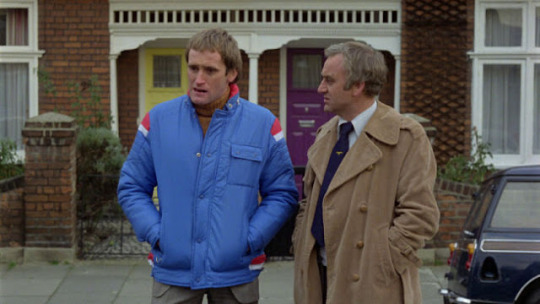

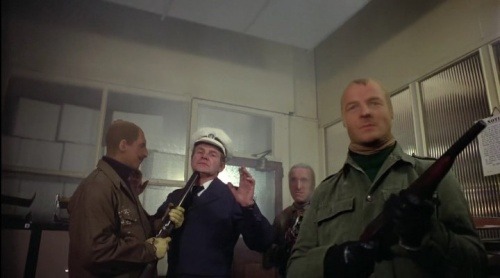
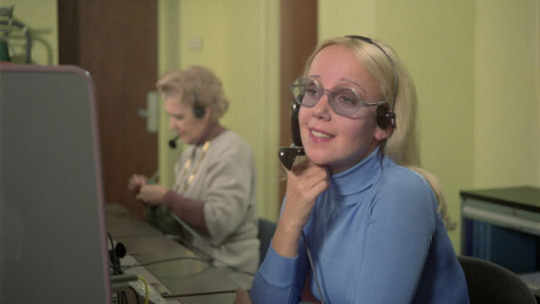

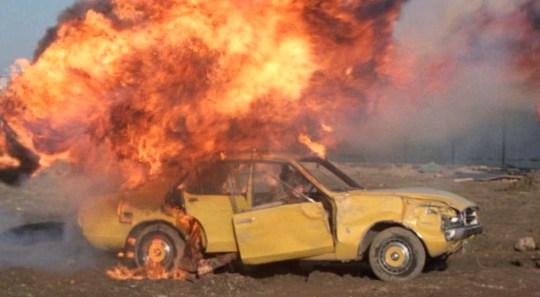
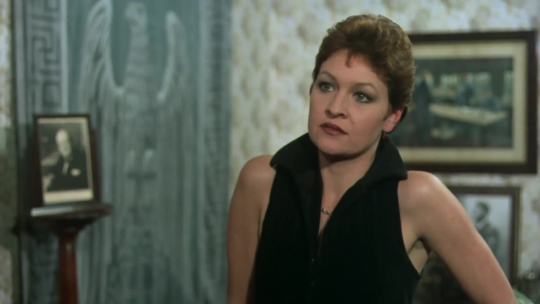
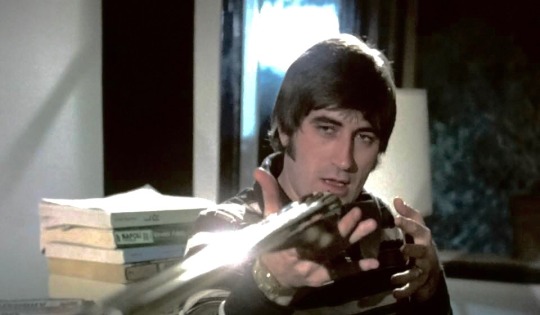

Sweeney 2 (1978)
"Hold it right there, squire. You're privileged to be looking down the barrels of a gold-plated sawn-off Purdy shotgun. Now as a bank manager, you'll appreciate that any man capable of cutting a gun like that in half wouldn't think twice about cutting you in half."
#sweeney 2#the sweeney#british cinema#1978#blood tw#troy kennedy martin#ian kennedy martin#tom clegg#john thaw#dennis waterman#denholm elliott#ken hutchison#anna gaël#anna nygh#lewis fiander#derrick o'connor#john flanagan#james warrior#john lyons#brian hall#george innes#roddy mcmillan#i think I'm probably in a minority here‚ but i actually think i prefer this (rushed‚ budget challenged) sequel to the og Sweeney movie.#that film took the natural step of going bigger than the series: a high stakes conspiracy thriller plot‚ bigger stunts‚ more sex and bloody#violence; this film instead takes a more naturalistic case‚ the kind of job that the series did so well‚ and just pushes into it a little#deeper and a lot darker (and admittedly still with greater sex and violence). the result is a glum crime thriller which perfectly matches#the melancholy trajectory the series had headed in towards its conclusion (as the real Flying Squad became embroiled in one of the biggest#and most shocking corruption scandals ever to hit uk policing). grim‚ moody and undeniably flawed in places but quite a gutsy move#to go introspective and even semi analytical in their final big screen fling. middle act is lighter and looser but start and ending this is#punchy and gripping and nailbiting stuff (except the very final scene‚ a misjudged bit of levity which undercuts the heavier scene before)
7 notes
·
View notes
Text

Janis Paige (born Donna Mae Tjaden; September 16, 1922 – June 2, 2024) Film, stage and television actress and singer. With a career spanning nearly 60 years, she was one of the last surviving stars from the Golden Age of Hollywood.
During the 1955–1956 television season, Paige starred in her own sitcom It's Always Jan as Janis Stewart, a widowed mother.Janis Paige in It's Always Jan (1955–1956)
Paige made her live dramatic TV debut June 27, 1957, in "The Latch Key" on Lux Video Theatre. She appeared as troubadour Hallie Martin in The Fugitive episode "Ballad for a Ghost" (1964). She also had a recurring role as Auntie V, Tom Bradford's sister, in Eight Is Enough.
Paige appeared as a waitress named Denise in both the seventh and ninth seasons of All in the Family. In her first appearance, she has a flirtation with Archie Bunker that threatens to become serious.
Paige appeared on episodes of 87th Precinct; Trapper John, M.D.; Columbo; Night Court; Caroline in the City; and in the 1975 television movie John O'Hara's Gibbsville (also known as The Turning Point of Jim Malloy). In 1982, she appeared on St. Elsewhere as a female flasher who stalked the hallways of the hospital to "cheer up" the male patients. She also appeared on a season 11 episode of Happy Days, as a roadside diner waitress named Angela who may or may not be Fonzie's long lost mother; Fonzie has a heartfelt talk with Angela, and it is left up to the viewer to determine if she is his mother or not – though the emotions exhibited by her character throughout the scene indicate that she is, but does not want to be found out. In the 1980s and 1990s, she was seen on several soap operas, including Capitol (1987, as Sam Clegg's first wife, Laureen), General Hospital (1989–1990, as Katharine Delafield's flashy Aunt Iona, a lady counterfeiter), and Santa Barbara (1990–1993, replacing Dame Judith Anderson as matriarch Minx Lockridge). (Wikipedia)
IMDb Listing
#Janis Paige#TV#Obit#Obituary#O2024#It's Always Jan#Eight Is Enough#Happy Days#Capitol#General Hospital#Santa Barbara
12 notes
·
View notes
Text
I ended up buying one of the audio books that Tom Clegg narrated (The Sinking Admiral, for anyone interested) and I was not mentally prepared to hear Ernest Greeves' voice reading out the lines of a wannabe seductress cougar. Oh my God. This is brilliant. I'm having the time of my life
9 notes
·
View notes
Text
Stats from Movies 801-900
Top 10 Movies - Highest Number of Votes
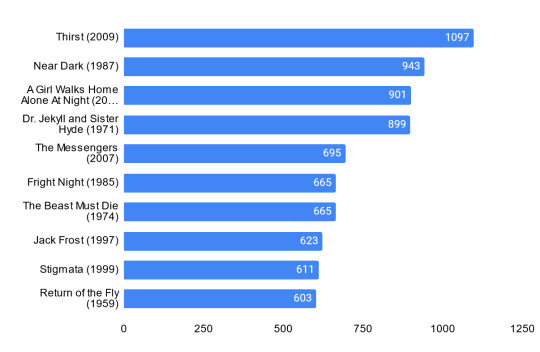
Thirst (2009) had the most votes with 1,097 votes. Captain Clegg (1962) had the least votes with 413 votes.
The 10 Most Watched Films by Percentage

Fright Night (1985) was the most watched film with 32.8% of voters out of 665 saying they had seen it. Zibahkhana (2007) had the least "Yes" votes with 0% of voters out of 444.
The 10 Least Watched Films by Percentage
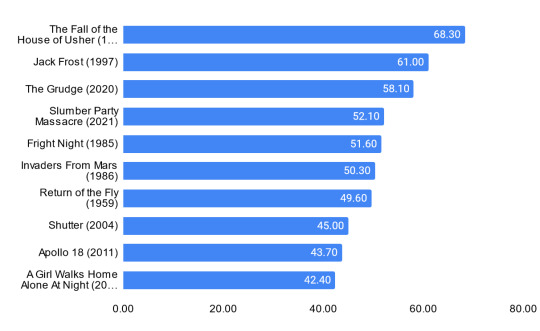
The Fall of the House of Usher (1960) was the least watched film with 68.3% of voters out of 492 saying they hadn’t seen it. Sewing Love (2023) had the least "No" votes with 5,9% of voters out of 523.
The 10 Most Known Films by Percentage

Fright Night (1985) was the best known film, 14,6% of voters out of 665 saying they’d never heard of it.
The 10 Least Known Films by Percentage
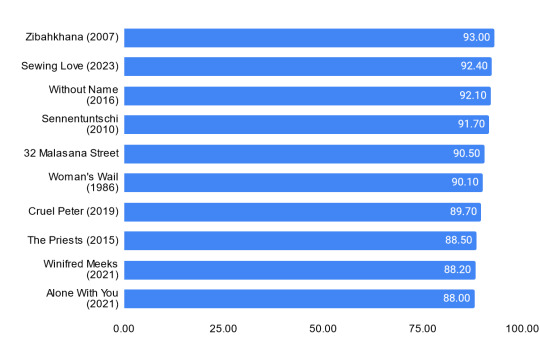
Zibahkhana (2007) was the least known film, 93% of voters out of 444 saying they’d never heard of it.
The movies part of the statistic count and their polls below the cut.
Near Dark (1987) The Wrath (2018) The Uncanny (1977) Fright Night (1985) Zibahkhana (2007) My Best Friend Is a Vampire (1987) Willard (1971) Woman's Wail (1986) The Atticus Institute (2015) Resurrección (2016)
Nanny (2022) The Lodgers (2017) Dead Birds (2004) The Medium (2021) Captain Clegg (1962) The Flesh and the Fiends (1960) Hagazussa (2017) The Priests (2015) The Wailing (2016) The Devil's Doorway (2018)
House of Usher (1960) Shutter (2004) Without Name (2016) Lake Bodom (2017) The Axe Murders of Villisca (2016) Under the Shadow (2016) Southbound (2015) The Dybbuk (1937) The Golem (2018) Invaders from Mars (1986)
Birth/Rebirth (2023) Dave Made a Maze (2017) Await Further Instructions (2018) The Beast Must Die (1974) Imprint (2006) A Wounded Fawn (2022) The Housemaid (2016) Slash/Back (2022) Slumber Party Massacre (2021) Sissy (2022)
In The Spider's Web (2007) Maneater (2007) Stigmata (1999) Resurrection (2022) The Pale Door (2020) Jack Frost (1997) Return of the Fly (1959) She Will (2021) Spiral (2019) The Strange House (2020)
Mary Reilly (1996) The Binding (2020) 32 Malasana Street (2020) The Strange House (2015) Nobody Sleeps in the Woods Tonight (2020) The Reaping (2007) The Moth Diaries (2011) Let Us Prey (2014) The Possession of David O'Reilly (2010) The Burrowers (2008)
Cruel Peter (2019) Sewing Love (2023) A Girl Walks Home Alone at Night (2014) Dr. Jekyll & Sister Hyde (1971) Darkness Falls (2003) Night Killer (1990) Mr. Harrigan's Phone (2022) Black Sunday (1960) Superhost (2021) The Puppetman (2023)
Tom at the Farm (2013) Malum (2023) Suitable Flesh (2023) The Deep House (2021) Winifred Meeks (2021) Son (2021) The Banishing (2020) Alone with You (2021) Enys Men (2022) The Unkindness of Ravens (2016)
Sennentuntschi (2010) The Queen of Spades (1949) Super Dark Times (2017) Lokis: A Manuscript of Professor Wittembach (1970) Life (2017) Citadel (2012) Creep (2004) Thirst (2009) The Canal (2014) A Tale of Two Sisters (2003)
The Innkeepers (2011) The Sacrament (2013) Apollo 18 (2011) The Outwaters (2022) Horror in the High Desert (2021) Spring (2014) The Uninvited (2009) The Grudge (2020) The Messengers (2007) Rawhead Rex (1986)
18 notes
·
View notes